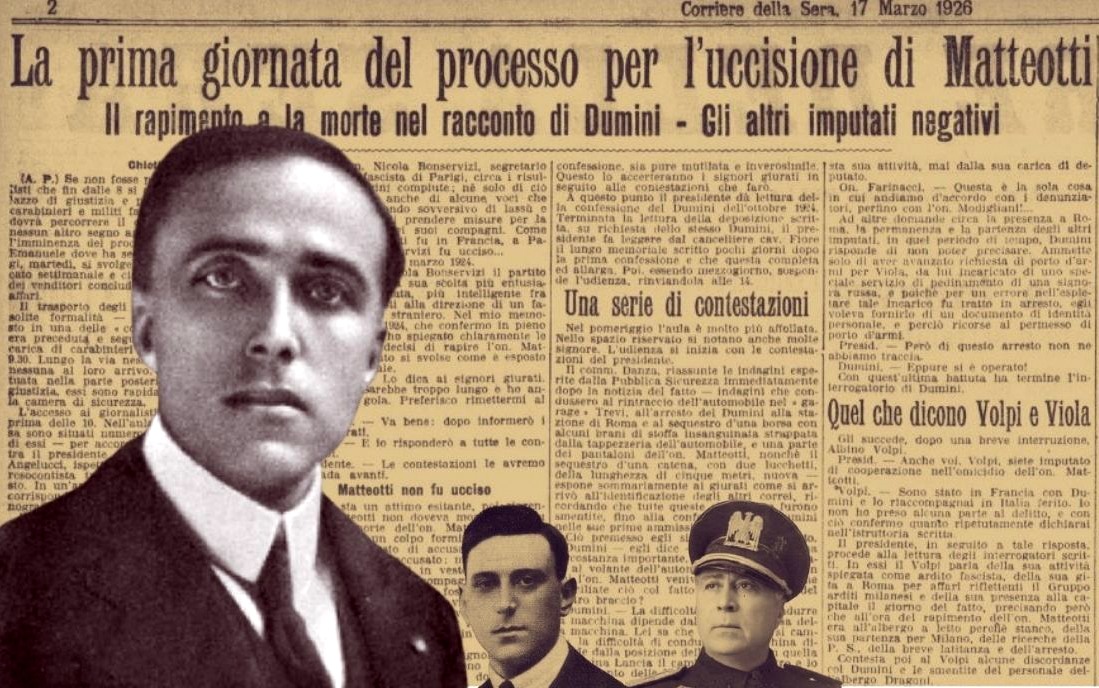We publish an article by Alfio Bernabei, from the ANPI UK & Ireland section.
The murder of Italian MP and opposition leader Giacomo Matteotti on June 10, 1924, was perpetrated by fascist assassins whose bravado led them to make mistakes that led to their arrest shortly thereafter. But Mussolini, as Prime Minister, managed the situation to his advantage. He had been a successful newspaper editor, and his press office was in contact with at least forty-five newspapers open to receiving instructions.
The assassination was ordered for political reasons. Matteotti had become a highly effective opponent of fascism on several fronts. He possessed unparalleled expertise in investigating financial matters, from budgets to maladministration. He was a fervent supporter of parliamentary democracy and freedom of speech. He was in a privileged position to exert influence abroad over socialist parties and trade unions, which he hoped to enlist to create a cross-border anti-fascist front.
Three days after his assassination, a fascist newspaper, Il Nuovo Paese, diverted attention from the political motivations of the crime. A front-page article insinuated a flurry of highly suggestive, yet unfounded, allusions to lurking financial scandals.
Rumors of irregularities related to oil exploration rights in Italy had been circulating for months without much success. Now, the story that Matteotti, during his clandestine visit to London in April, had obtained concrete evidence of bribes paid by an American oil company, Sinclair, to high-ranking figures in fascist circles and was prepared to reveal the details to Parliament was given credence by several newspapers.
Matteotti’s wife, Velia, reacted with dismay. He warned that a “legend” was being constructed to divert attention from the political motives behind the murder. But no one was willing to listen to the widow’s complaints.
Mussolini was happy that the distraction was working in his favor. And in any case, if any evidence of accomplices involved in accepting bribes materialized, he would have no choice but to get rid of the culprits. Gasoline and bribes? Not surprising.
The false trail was silenced shortly after the 1926 trial of those arrested proved to be a farce. It was revived especially in the 1990s, when the fascists returned to government, led by Berlusconi – the beginning of a large-scale historical revisionism to cleanse fascism of its crimes and pave the way for the return of Mussolini’s heirs to power. The 3,200 toponymic references to Matteotti – streets and squares named after him throughout Italy – could not be erased. But stories reminiscent of the Lockheed scandal, the perfidious Seven Sisters, and the mysterious death of oil industry official Enrico Mattei may help bury Matteotti in the fog of fiction.
It took the centenary of Matteotti’s murder, a year ago, for several historians to carefully examine the available documentation and determine the evidence, if any, that Matteotti was in possession of sensitive documents obtained in London from the Labour Party, as suggested by, among others, Il Popolo d’Italia, a newspaper edited by Mussolini’s brother, Arnaldo.
Was there evidence that Matteotti had bribe documents with him at the time of his kidnapping? None. Evidence that such documents ever existed? None.
After dozens of books based on speculation amounting to a scandal-ridden Sinclair-like industry, a brilliant essay entitled “On the Matteotti Crime,” written by historian Giampiero Buonomo, has finally been published. “The legend (that Matteotti was about to make terrible revelations about shady dealings involving the oil company and fascism) has the same substance as dreams,” he writes, debunking false leads and restoring Matteotti to history as it should be. A staunch enemy of fascism. A political assassination.
On this centenary of the so-called “Manifesto of Anti-Fascist Intellectuals,” published in 1925 under the principal guidance of philosopher Benedetto Croce, we can add another episode that helped Mussolini ride the wave of protests sparked by the murder and survive to establish a full-fledged dictatorship.
On June 24, 1924, just two weeks after the assassination of Matteotti, whose body had not yet been found, Croce, highly influential at the time, was among those who offered their support to Mussolini’s fascist government during a vote of confidence in the Senate. He had been a fascist sympathizer from the beginning and was still inclined to give him a chance, despite Matteotti’s urgent appeal, launched on





